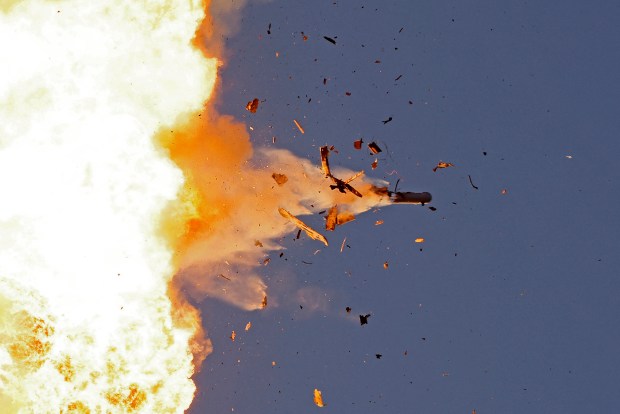For a brief moment this weekend, it looked as if the looming regional war that officials and analysts inside and outside the Middle East were concerned about for weeks had finally reared its ugly head.
Acting on intelligence that Hezbollah was about to launch a large-scale drone and missile attack on targets deep into Israel, 100 Israeli aircraft were scrambled for a bombing run into southern Lebanon. About 40 Hezbollah military targets were struck simultaneously, derailing what Israeli security sources claimed was an imminent Hezbollah attack on northern and central Israel. Hezbollah retaliated shortly thereafter, sending approximately 340 rockets into Israel — the largest Hezbollah barrage since the cross-border fighting occurred in October. When all was said and done, two Hezbollah fighters and one Israeli sailor were killed.
That’s the bad news. The good news: Both sides are claiming victory and seem to want to move on. Israeli Prime Minister Benjamin Netanyahu and the Israel Defense Forces, or IDF, are playing up Israel’s tactical proficiency against the Lebanese militia, stating that a much more deadly Hezbollah attack was averted. Meanwhile, Hezbollah leader Hassan Nasrallah is puffing out his chest and alleging that the group has avenged the death of one its senior commanders in an Israeli airstrike last month. “At this current stage, the country (Lebanon) can take a breath and relax,” Nasrallah said in a speech after the rocket attack.
Although Israel and Hezbollah have been sending ordinance at each other for nearly a year, both sides appear to understand just how devastating a full-scale war would be for Israel and Lebanon, let alone the region at large. Indeed, according to Reuters, Israeli and Hezbollah officials exchanged messages stating that neither wished to escalate the fighting further. This is in keeping with an 11-month-long track record in which both parties effectively straddle the very thin line between contained military exchanges along the Israeli-Lebanese border region and full-fledged war that could cause thousands of civilian casualties. Israel has at times challenged that thin line, most notably on July 30 when it killed senior Hezbollah commander Fouad Shukur in al-Dahiya, a southern suburb of Beirut, where the Hezbollah leadership is based.
It’s no surprise that Israel and Hezbollah would prefer to avoid an all-out confrontation. Simply put, the stakes and costs are too high, and whatever benefits may be accrued would be overshadowed by the sheer destruction, both economically and in human terms, that would result.
Israel, of course, would do immense damage to Hezbollah’s military infrastructure and capability during a hypothetical war with the group. Israeli military intelligence on Hezbollah’s movements, weapons caches and facilities throughout Lebanon is quite good. Israel’s three-tiered air defense system has saved countless lives. And the IDF holds escalation dominance over the group, which means that Israel retains military advantages — large, well-trained ground forces, air power and higher-quality intelligence — that Hezbollah can’t match.
Yet even escalation dominance isn’t cost-free. A war against Hezbollah would make the ongoing war against Hamas in Gaza look like a day at the park. Unlike Hamas, Hezbollah possesses the kinds of weapons — medium-range, precision guided missiles, attack and surveillance drones of various ranges and a ground force that could be as high as 100,000 — that would make daily life in Israel hard to function. With upward of 150,000 missiles, Hezbollah has the capacity to hit targets anywhere in Israel, and you can bet that Tel Aviv, Israel’s largest city, would be on the list. Israel’s economy, which contracted in the last quarter of 2023, would likely contract further as the country mobilizes more military personnel — subtracting from the civilian workforce.
The IDF would seek to destroy Hezbollah in its entirety just as it’s now trying to do with Hamas. Yet the probability of the Lebanese militia simply vanishing into thin air — Hezbollah is also a political party and a decadeslong social movement — is about as low as winning the Powerball jackpot. Israel’s international reputation would also take a beating; any war against Hezbollah would likely involve striking infrastructure, like airports, ports and highways, that sustain a country that is already suffering an economic catastrophe.
Hezbollah wouldn’t win by sparking a war either. Its last major conflict with Israel in 2006 was commonly viewed as a relative success in that it forced Israel to withdraw from Lebanon without achieving all of its military objectives. But the damage to Lebanon during the one-month war was extensive, and it took years for the country to rebuild. In fact, weeks after a cease-fire was declared, Nasrallah openly regretted going through with it.

The regrets would be even heavier today. The Lebanese people, after all, are already dealing with extensive financial calamity. Lebanon’s economy has contracted by two-thirds since 2018, the product of a banking crisis, systemic corruption and a decline in international donor support. The World Bank assesses that Lebanon’s poverty rate has more than tripled over the last decade. The wealthy Gulf States like Saudi Arabia, the United Arab Emirates and Qatar will think twice before helping Lebanon rebuild again. A war against the Middle East’s most formidable power would exacerbate all of these problems, running the risk of souring Hezbollah’s popular support within the Lebanese public and giving its political opponents an opportunity to paint the movement as the prime instigator of the country’s misery. In short, Hezbollah can’t ignore all of these economic and political considerations.
None of this means that we’re out of the woods. A war between Israel and Hezbollah is still very much a live possibility — and it will continue to be a possibility as long as a cease-fire deal in Gaza is elusive. But rationality has ruled the day thus far.
Daniel DePetris is a fellow at Defense Priorities and a foreign affairs columnist for the Chicago Tribune.
Submit a letter, of no more than 400 words, to the editor here or email letters@chicagotribune.com.



